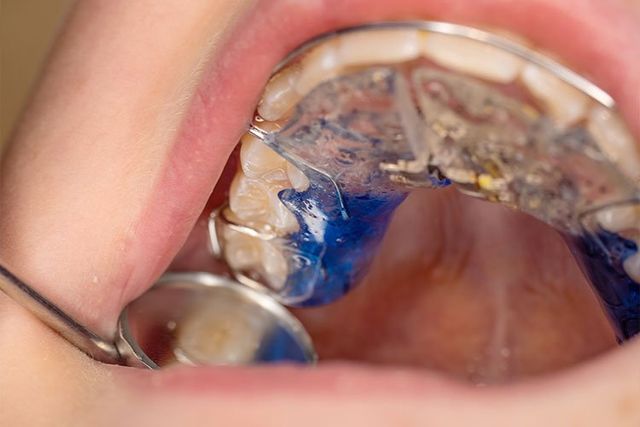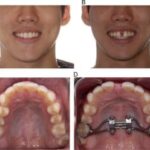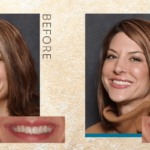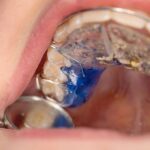What is a Palate Expander?
A palate expander is a dental device that is used to widen the upper jaw in adults. It is commonly used in orthodontics to correct issues with the alignment of the teeth and improve the overall bite. The device is typically made of metal and consists of two halves that are connected in the middle by a screw. The expander is custom-made to fit the patient’s mouth and is attached to the teeth using bands or brackets.
The purpose of a palate expander is to create more space in the upper jaw by gradually widening it. This can help to correct problems such as crowding of the teeth, crossbites, and narrow arches. By expanding the upper jaw, the palate expander can also improve breathing and alleviate issues related to sleep apnea and snoring.
The process of using a palate expander in adults usually involves a period of activation, during which the screw in the expander is turned to gradually widen the device. This process is typically done by the patient or a dental professional using a special key. The expansion is usually done in small increments, with adjustments made every few days or weeks, depending on the individual case.
Why is a Palate Expander Used in Adults?
A palate expander is a dental device that is used in adults to correct certain dental issues related to the palate or the roof of the mouth. The main purpose of a palate expander is to widen the upper jaw in order to create more space for the teeth. This can be beneficial in cases where there is crowding of the teeth or a narrow upper jaw.
In adults, a narrow upper jaw can lead to a variety of problems, including difficulty breathing, speech issues, and dental misalignment. By using a palate expander, these issues can be addressed and corrected. The expander works by applying gentle pressure to the palate, gradually widening it over time.
There are several reasons why a palate expander may be used in adults. One common reason is to correct a crossbite, which occurs when the upper teeth fit inside the lower teeth when the jaw is closed. This can lead to uneven wear of the teeth and jaw misalignment. By widening the upper jaw with a palate expander, the bite can be corrected and the teeth can fit together properly.
Another reason for using a palate expander in adults is to address issues related to a narrow upper jaw. A narrow jaw can result in crowded teeth, which can be difficult to clean and maintain. By widening the jaw, there is more space for the teeth to align properly, making oral hygiene easier and reducing the risk of dental problems such as cavities and gum disease.
In addition to these functional benefits, a palate expander can also have aesthetic advantages. By widening the upper jaw, the overall appearance of the face can be improved, creating a more balanced and symmetrical look. This can be particularly beneficial for individuals who are self-conscious about their smile or facial structure.
How Does a Palate Expander Work?
A palate expander is a dental device used to widen the upper jaw in both children and adults. It works by applying gentle pressure to the upper jaw, gradually separating the two halves of the palate. This expansion creates additional space for the teeth to properly align and improves overall oral health.
Palate expanders consist of a metal framework that is custom-made to fit the patient’s mouth. The device is typically attached to the molars using bands or cemented to the roof of the mouth with dental adhesive. Once in place, the expander is activated by turning a small screw or key, which applies pressure to the palatal bones.
Benefits of Palate Expansion
Palate expansion offers several benefits for adults, including:
- Improved breathing: By widening the upper jaw, palate expanders can help alleviate breathing problems caused by narrow nasal passages or a deviated septum.
- Enhanced dental alignment: Palate expansion creates more space for crowded teeth, allowing them to align properly and reducing the need for orthodontic treatment.
- Improved speech: In some cases, a narrow palate can contribute to speech impairments. Palate expansion can help improve speech clarity and articulation.
- Prevention of future dental issues: By expanding the palate, the risk of developing dental issues such as impacted teeth, gum disease, and temporomandibular joint (TMJ) disorders can be reduced.
What are the Side Effects of a Palate Expander?
A palate expander is a dental device used to widen the upper jaw in adults. While it can be an effective treatment option, there are some potential side effects that patients should be aware of.
2. Speech Impairment: Another side effect of a palate expander in adults is temporary speech impairment. The device can affect the positioning of the tongue and interfere with normal speech patterns. However, most patients adjust to the expander within a few days or weeks, and their speech returns to normal.
3. Difficulty Eating: Initially, patients may find it challenging to eat or chew with a palate expander. The device can make it difficult to close the mouth properly, leading to discomfort while eating. However, with time, patients learn to adapt and find ways to eat comfortably while wearing the expander.
4. Temporarily Altered Appearance: A palate expander can temporarily alter the appearance of the face. The device may make the upper jaw appear wider, and the lips may protrude slightly. However, these changes are usually subtle and resolve once the treatment is complete.
5. Gum and Mouth Irritation: The metal components of the palate expander can cause irritation and soreness in the gums and mouth. It is essential to maintain good oral hygiene and regularly clean the device to minimize discomfort and prevent infections.
Overall, the side effects of a palate expander in adults are usually temporary and manageable. With proper care and adjustment, patients can achieve the desired results and improve their dental health.
Pain and Discomfort
One of the potential side effects of using a palate expander in adults is pain and discomfort. This is a common occurrence during the initial stages of treatment and is usually temporary. The discomfort is typically felt in the mouth, jaw, and teeth.
When a palate expander is first inserted, it applies gentle pressure to the roof of the mouth, causing the bones to gradually separate and create more space. This expansion process can result in soreness and tenderness in the affected areas.
Managing Pain and Discomfort

To alleviate the pain and discomfort associated with a palate expander, there are several steps that can be taken:
- Pain medication: Over-the-counter pain relievers such as ibuprofen or acetaminophen can help reduce pain and inflammation.
- Oral hygiene: Maintaining good oral hygiene is essential during treatment. Regularly brushing and flossing can help prevent gum irritation and reduce discomfort.
- Soft diet: Consuming soft foods can help minimize discomfort while chewing. Avoiding hard, crunchy, or sticky foods can prevent additional irritation.
- Ice packs: Applying ice packs to the affected area can help numb the pain and reduce swelling.
- Wax or dental silicone: Placing wax or dental silicone on the palate expander can provide a cushioning effect and reduce irritation.
Speech Impairment
One of the potential side effects of using a palate expander in adults is speech impairment. This occurs because the palate expander takes up space in the mouth, which can affect the movement and placement of the tongue and other oral structures involved in speech production.
When the palate expander is first installed, it may feel uncomfortable and foreign in the mouth, making it difficult to speak clearly. The expansion of the palate can also lead to changes in the resonance of the voice, causing speech to sound different or muffled.
Additionally, the presence of the palate expander can make it harder to pronounce certain sounds, such as sibilant sounds like “s” and “sh,” as well as nasal sounds like “m” and “n.” This can result in a temporary lisp or other speech difficulties.
Difficulty Eating

One of the side effects that adults may experience when using a palate expander is difficulty eating. This is mainly due to the physical changes that occur in the mouth during the expansion process.
When a palate expander is used, it widens the upper jaw by gradually separating the palatal bones. This expansion creates more space in the mouth, allowing for proper alignment of the teeth and improved bite. However, during the initial stages of the treatment, the palate expander can make it challenging to eat certain foods.
It is also common for individuals to experience an increased production of saliva when wearing a palate expander. This excess saliva can make it difficult to swallow, leading to the feeling of constantly needing to spit. Drinking plenty of water and staying hydrated can help alleviate this issue.
Furthermore, the presence of the palate expander may affect the way the tongue moves and functions while eating. This can result in temporary difficulties with tongue placement and coordination, making it challenging to manipulate food in the mouth. With time and practice, most individuals adapt to these changes and regain their ability to eat comfortably.
Temporarily Altered Appearance
Additionally, some adults may experience a slight gap between their front teeth during the expansion process. This is a normal part of the treatment and is temporary. The gap will typically close once the expansion is complete and the teeth have settled into their new positions.
Managing the Altered Appearance
- Practice good oral hygiene: Maintaining proper oral hygiene during treatment can help ensure that the teeth and gums remain healthy.
- Focus on the end result: Keep in mind that the temporary changes are a necessary step towards achieving a straighter smile and improved dental health.
By following these tips and staying focused on the end result, adults undergoing palate expansion can successfully manage the temporarily altered appearance and achieve their desired orthodontic outcome.
Gum and Mouth Irritation

One of the side effects of a palate expander in adults is gum and mouth irritation. This can occur due to the pressure exerted on the gums and soft tissues in the mouth by the expander.
Tips for Managing Gum and Mouth Irritation:
- Practice good oral hygiene by brushing and flossing regularly.
- Rinse the mouth with warm saltwater to soothe the gums and promote healing.
- Avoid eating hard or sticky foods that may aggravate the irritation.
- Use a soft-bristled toothbrush and gentle brushing techniques to avoid further irritation.
- Apply a topical oral gel or ointment recommended by your dentist to relieve pain and reduce inflammation.
- Avoid touching or picking at any sores or ulcers that may develop.
- Stay hydrated and drink plenty of water to keep the mouth moist.
By following these tips and seeking professional guidance, gum and mouth irritation caused by a palate expander in adults can be effectively managed and minimized.
Maintenance and Care
Proper maintenance and care of a palate expander are essential to ensure its effectiveness and longevity. Here are some important guidelines to follow:
1. Regular Cleaning
2. Avoid Sticky and Hard Foods
While wearing a palate expander, it is best to avoid sticky and hard foods that can damage or dislodge the appliance. Foods like chewing gum, caramel, and hard candies should be avoided. Stick to a soft diet and cut your food into small, manageable pieces.
3. Follow Oral Hygiene Practices
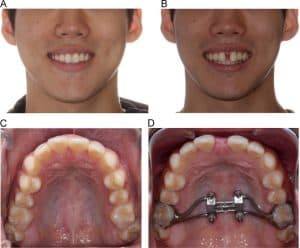
Continue to practice good oral hygiene while wearing a palate expander. Brush your teeth at least twice a day and floss daily to remove any food particles that may get trapped around the expander. Consider using an antimicrobial mouthwash to further reduce the risk of infection.
4. Attend Regular Dental Check-ups
5. Be Gentle with the Expander
Avoid applying excessive force or pressure on the expander. Be gentle when brushing or flossing around the appliance to prevent any damage. If you experience any discomfort or notice any loose or broken components, contact your dentist immediately.
6. Follow the Dentist’s Instructions
By following these maintenance and care tips, you can ensure that your palate expander functions properly and helps you achieve the desired orthodontic outcomes. Remember to consult your dentist if you have any concerns or questions regarding the maintenance and care of your palate expander.
When to Consult a Dentist
7. Concerns or Questions: If you have any concerns or questions about your palate expander or its side effects, it is always best to consult a dentist. They can provide guidance, reassurance, and any necessary treatment.

Dr. Fidel Cann: Esteemed orthodontist with a lifelong dedication to enhancing smiles and oral health. Pioneering expertise, compassionate care.
